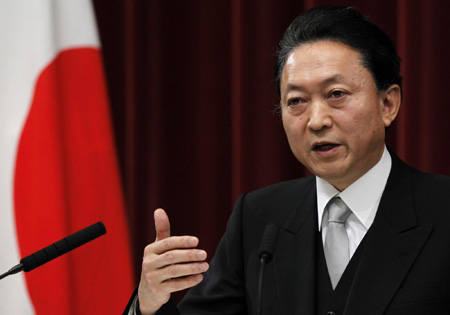Asia-Pacific
Japanese gov't not to allow double-dip recession
(Xinhua)
Updated: 2010-01-04 16:30
 |
Large Medium Small |
 Japan's Prime Minister Hatoyama speaks during a New Year news conference in Tokyo.[Agencies] |
TOKYO: Japanese Prime Minister Yukio Hatoyama Monday vowed to make every effort to prevent the nation from sinking deeper into recession by expeditiously passing budget bills for the current financial year and next.
At his first press conference of 2010 at his official residence in Tokyo, Hatoyama said "With the feeling that the economy must not be allowed to go into a double-dip, that we will not allow it to do so, we compiled emergency measures and a second extra budget at the end of last year."
| ||||
Regarding a particularly thorny issue that escalated during the Democratic Party of Japan's (DPJ) election campaign, the Japanese leader also pledged to resolve the ongoing dispute with the United States over the relocation of the US Marine Corps' Futemma Air Station, in Okinawa Prefecture, "within several months" and in the best interests of all concerned, including the local residents of Okinawa.
In late December last year, Hatoyama promised to reach a decision on the matter, which has increasingly strained ties with Washington, by May. Washington's stance on the Futemma issue has remained unchanged and wants Tokyo to abide by an accord reached in 2006.
The Prime Minister also voiced his ongoing plight to establish more "equal" ties between Japan and the U.S.
As for personnel changes in his administration, the Prime Minister said that he has no plans for a cabinet reshuffle before the House of Councilors election this summer. He maintained that his priority for the country is the passing of the budgets, which he said would help protect people's livelihoods and elevate the economy.
Since the Hatoyama-led DPJ's meteoric rise to power in August 2009, the Japanese leader's popularity ratings have dropped below50 percent as concerns mount as to his ability to lead the country out of recession, stabilize shaky ties with Washington and sustain meaningful alliances with his Asian neighbors, in line with his pledge to create an "East Asian Community" that was less reliant and more autonomous from the United States.









